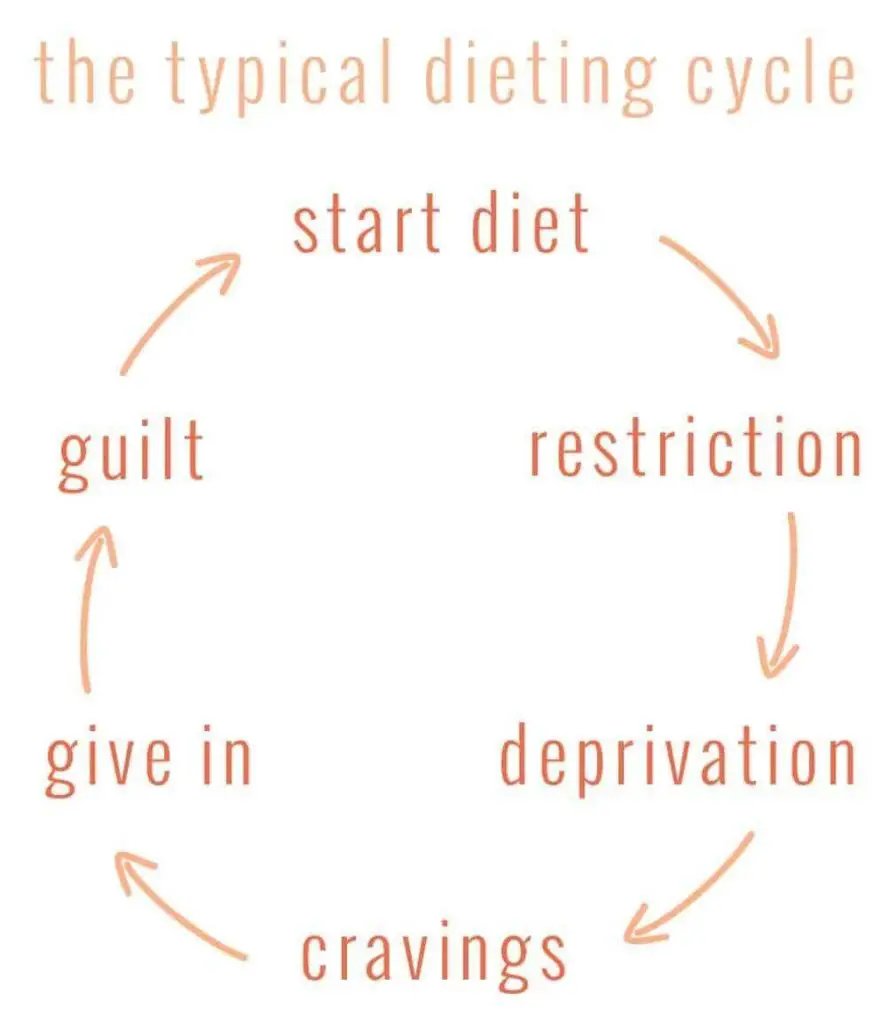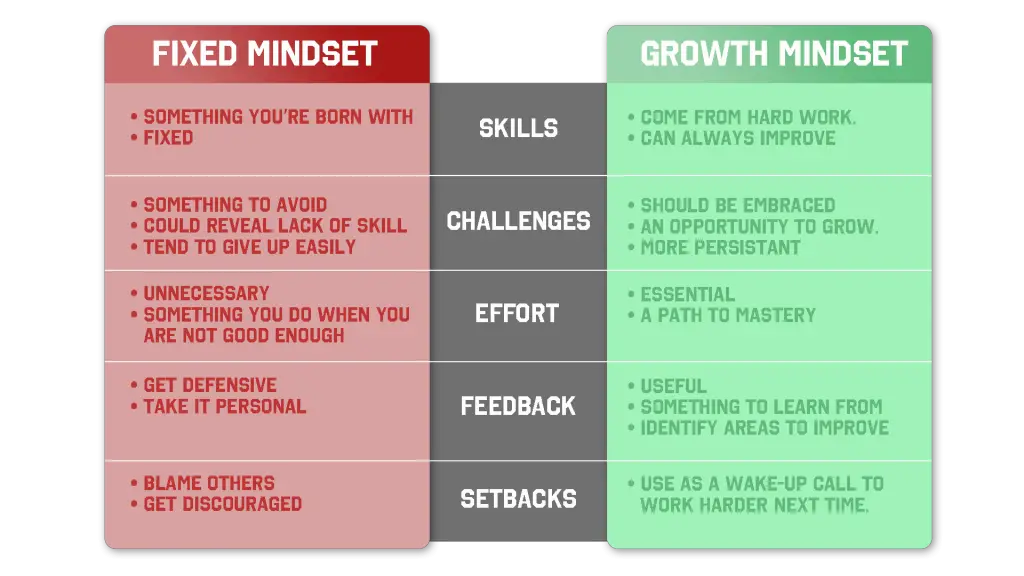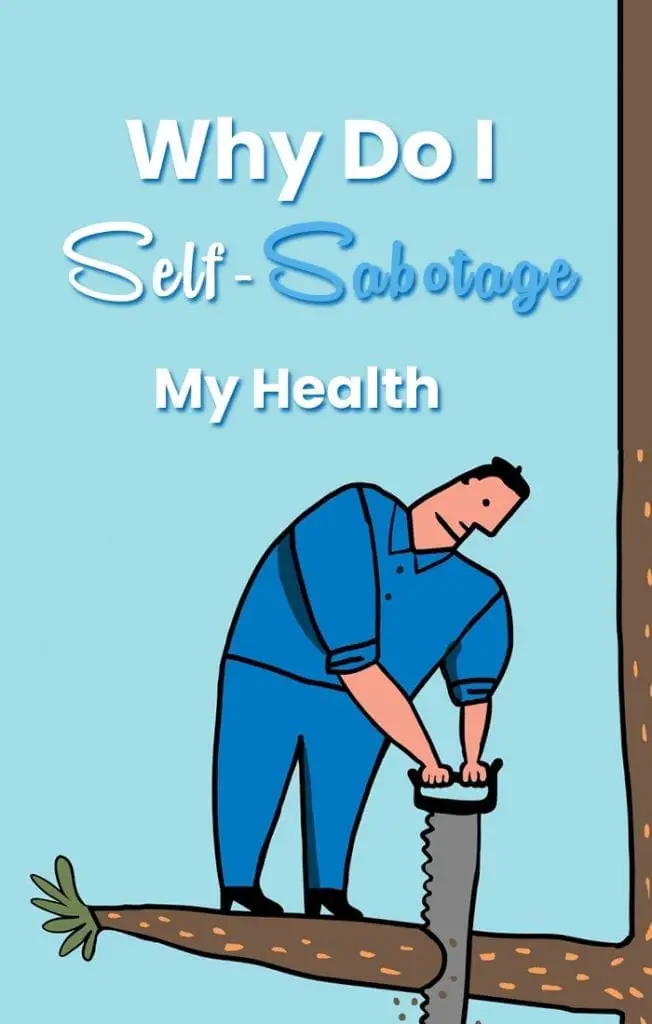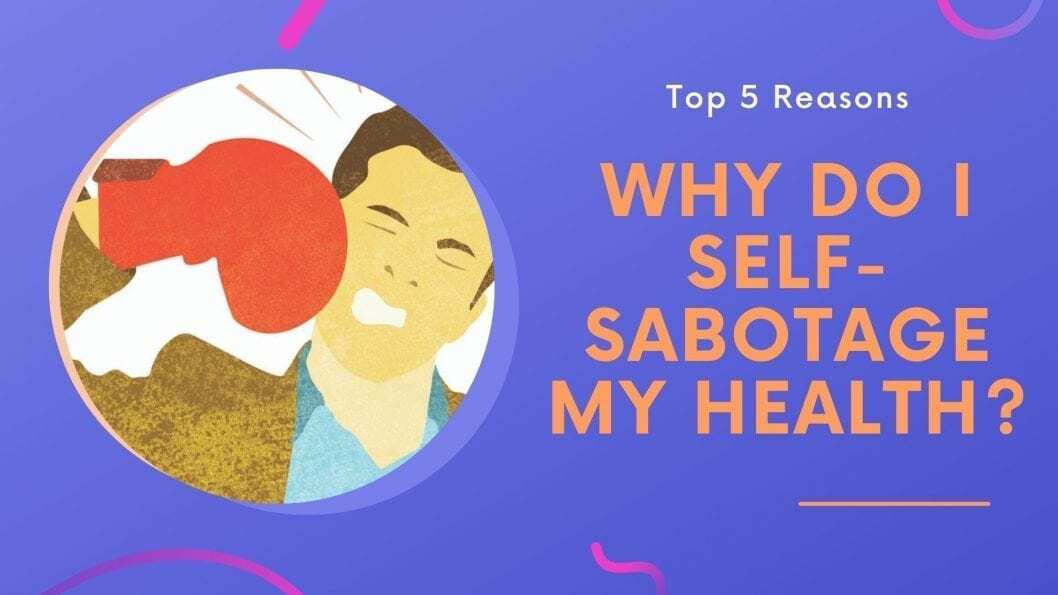Self-sabotage behaviors are when you have a goal, but do stuff that prevents you from reaching that goal.
In terms of health, self-sabotage is when you have a goal like to lose weight or eating healthier.
But then you overeat or binge! And there can be many other self sabotaging behaviors too, like laziness or alcohol.
Obviously overeating, binge eating and other self-sabotage behaviors won’t bring you closer to your goals so …
Why do you self-sabotage your health, like binge eating self sabotage?
What causes self sabotaging behavior? How do you conquer self-sabotage?
And what is self sabotaging in the first place?!
What Is Self Sabotage?
Before we talk about the causes of self-sabotage and how to overcome self-sabotage, let’s identify what self-sabotage looks like.
As we mentioned earlier, self-sabotage has many different forms.
You can either do something like binge eat. Or you can not do something like not move your body or not meal prep.
Either you do something ‘bad’ or you don’t do something ‘good’. Either way you don’t move closer to your goals or make any progress.
Eventually you lose motivation and feel like everyday’s an uphill climb. One starts to hate the journey one has to make towards their goals.
They feel discouraged.
At this moment, it becomes very easy to begin sabotaging your goals.
You can mentally self-sabotage yourself by thinking negative thoughts.
When you are discouraged and don’t like the journey, then you begin to show these 7 different signs of self-sabotage:
7 Signs Of Self Sabotage
- Secret Eating By Yourself – You don’t tell anyone you are eating more, and it’s easier to pretend like there is not a problem.
- Perfection Or Go For Broke – This is where you shoot for perfect. But when you fail to be ‘perfect’ you say ‘well, I failed, so might as well eat all I can.’ Instead of this try, try practicing acceptance.
- Not Trying New Things – You’re so afraid of failure you won’t try new things
- Not Enough Time – You may be busy, but everybody has enough time to take small steps and build momentum.
- Too Fast Expectations – You’ve been making good progress, but it doesn’t feel like it’s fast enough according to your expectations, so you go overboard.
- Working Too Hard – This is really common and something we discuss below. One can easily work too hard and become deprived. This is probably the most common cause of self-sabotage.
- Stuck In The Past – You failed one time to lose weight and now think the future is set in stone too.
Now let’s explore about what causes self sabotaging in more detail. So many people are wondering to themselves, ‘Why do I self-sabotage my health’?
Why do people become discouraged in the first place and become susceptible to self-sabotage?
1 – Wrong Mindset
In our Western culture we are told to “Just Do It”.
Many of us try to approach weight loss and health with this “Just Do It” attitude.
Unfortunately, no matter how motivated we are in our weight loss goals, for example to lose the weight we’ve accumulated over years, your weight loss efforts will lead to waste because you are in the wrong mindset.
We all know that 95% of diets fail. But why?
Essentially, the reason diets and many health management systems fail is because you are approaching your weight loss goals and weight loss efforts with the “Just Do It” mentality.
(And this mentality can be generalized to other goals besides weight loss like eating better, having more energy, etc)
Overall, the “Just Do It ” approach is dangerous because it leads directly to deprivation and self-sabotage.
We’ll talk more about below how using too much willpower in the “Just Do It” approach leads to deprivation and self-sabotage.
But why do we have this “Just Do It” approach when it doesn’t work?
The evil diet and weight loss industry is responsible for this type of thinking.
- The diet & weight loss industry is worth $1 trillion globally
- The industry spends billions of dollars per year convincing people to buy their programs
- If the programs worked, then customers would never purchase again
- So the programs are designed to temporarily work but fail in the long term
- When the program fails, the key thing to know is that the customer is led to blame themselves and think that they self-sabotaged.
- If the customer blamed, the diet then they wouldn’t purchase another diet program
- So customer needs to blame themselves and think they self-sabotaged, and then buy another diet or weight loss product again
This “Just Do It” type of thinking is erroneous. However, it’s tricky to see through the marketing guises that the evil diet and weight loss industry espouse.
Here’s a simple analogy:
The diet industry wants you to think your truck has an infinite supply of gasoline.
(I know this sounds silly, but when 95% of people fail diets repeatedly, sometimes silly metaphors are useful to help see things differently.)
Despite the silliness, many people act like they have an infinite amount of gasoline / willpower to:
- Follow a diet plan
- Work out 5 days a week
- Be perfect
Unfortunately, you don’t have infinite willpower.
On one hand, we all know this. But then many times we forget.
And when trucks run out of gas … They crash. Or putter out and come to a standstill.
The same thing will happen to you if you rely on willpower.
You’ll use your willpower to go, go, go.
- Work hard
- Exercise
- Get everything done
- Be there for everybody
But then eventually you’ll crash. Or just be unable to continue.
2 – Not Enough Food Fuel

Let’s stick with this car analogy.
How do you fill up your gas tank?
Food is one answer.
The diet industry would like to tell you to just ‘push through the pain’ of hunger.
No pain, no gain, right?
The diet industry likes to promote eating less food and using willpower in place of food.
This ends up leading to people self-sabotaging because they are not eating enough food.
For example, the standard diet on MyFitnessPal is 1200 calories a day. Can you really expect to stick with this?
Harvard University conducted a powerful study on healthy males who ate 1500 calories a day.
What happened to these healthy guys after they went on a 1500 calorie diet?
They began to binge eat. They “fell off the wagon”.
They couldn’t stick to 1500 calories a day, let alone 1200 calories.
The same thing will happen to you too. If you are not getting enough food, then you will binge eat.
And then you may ask in frustration, ‘why do I self-sabotage my health?’!!!
3 – You Think You Lose Control, But Really Your Body Is Just Making You Overeat Because It’s Hungry
If your body gets too hungry, your stomach will shut down your thinking mind.
Why? Following one of those 1200 calories per day plans will put your body in a state of deprivation.
Since “you” are not feeding your body enough, the stomach then shuts down “your” ability to control your body.
The stomach is more powerful than we usually admit!
For example, many scientists are now considering the brain and gut connection to be a two way street.
This means your brains can influence what you eat, but your stomach can also influence your perception of food and influence your decision making.
However, people don’t realize their stomach took over their brain and made them overeat!
Instead, people think that “they” overate.
But really, your stomach is just trying to prevent you from starvation!
This is why so many people ask ‘why do I self-sabotage my health?’ because they don’t understand how their stomach can overpower their brain!
4 – Not Enough Mental & Emotional Fuel
Often people run low on mental and emotional fuel.
They are exhausted. Over-stressed.
They need rest, relaxation, and healing.
However, because of the evil diet and weight loss industry …
People instead think they need more willpower!
“Just Try Harder!”
“Just Push Yourself!”
However, your body needs rest as well.
Now if “you” don’t give your body time to relax and de-stress …
Then your body will take over and make you overeat!
Overeating Mimics Relaxation (Often With People Pleasers)
When you overeat, afterwards you are slowed down.
You are in a fog. You can hardly think anymore.
You can barely get up.
Do you see how overeating can mimic the effects of relaxation?
This phenomenon of eating to help people relax is most seen in people pleasers.
Many times a person’s pleasing personality is highly stressed out. They are highly empathetic and attuned to the needs of other people.
However, people pleasers often neglect their own personal needs.
Many clients of mine are people pleasers. They work very hard for others but don’t take time for themselves.
Oftentimes I’ll ask them about why they binge. At first they don’t understand.
But after reflection, many come to realize that binge eating makes them slow down.
5 – You Subconsciously Cling To Binge Eating To Stay Safe
Many clients I work with have been binge eating since they were young.
Deep down, many clients report fear over giving up binge eating.
Of course they know binge and emotional eating is ruining their lives.
But some part of this person wants to binge eat.
Loves to binge eat.
Why do you self-sabotage your health?
Because in many cases it goes back to when you were a child, and you learned to overeat to feel safe.
For example, let’s say your parents yelled at you. Then didn’t offer any words of encouragement.
You would feel horrible as a child.
You wouldn’t have the perspective that your parents were just having a bad day.
You would feel all these painful feelings and not know what to do.
Remember how slow time goes when you were a kid?
Feeling all these painful feelings and then time is going slow …
You need to deal with these feelings!
So you turned to food.
Food numbed you out.
Food was the soothing parent you didn’t have that dark night.
And now, years later …
You still subconsciously crave binge eating as a way to stay safe.
How Do You Conquer Self Sabotage?
So, how do we conquer self-sabotage?
The short answer is that we must flip self-sabotage away from being a mistake.”
Remember, the evil diet and weight loss industry wants you to believe that self-sabotage is your fault.
- It’s your fault you lost control!
- It’s your fault you were lazy and didn’t go to the gym!
- It’s your damn fault you overate!
But this type of thinking traps you in guilt.
Research has proven that body shaming doesn’t lead to changing behaviors.
In short, when people are body shamed they feel guilt.
When people feel guilt, they actually become more defensive, closed minded or develop a belief that they will fail.
For example, if some person is told they are ‘fat and need to lose weight’ this person will feel guilt and is more likely to:
- Avoid conversations that relate to health
- Avoid getting help for their health
- Believe they are a failure and NOT do anything either avoid
The key is to not feel guilty and ashamed and to see self-sabotage differently!
So, how do you see self-sabotage differently?
You switch your mindset!
Growth Mindset Versus Fixed Mindset

Take a look at this chart comparing fixed and growth mindsets. Most of the time people who self-sabotage have a fixed mindset because they blame themselves.
Fixed mindset is where you:
- Get defensive if you make a mistake
- Get easily discouraged
- Believe that you’re born with binge eating or stuck with it forever
For example, somebody who binge eats may think to themselves, “I screwed up.”
This person will be consumed with guilt and may lose hope. They think negative thoughts like “I am always a failure.”
If someone loses hope or sees themselves personally as a failure, then they can’t imagine a different future.
Negative thoughts end up creating a negative future.
People end up repeating the same behaviors again and again because they are ‘fixed’ in their negative way of thinking.
Instead of asking ‘why do I self-sabotage my health’ and person with a fixed mindset would:
- Throw their arms up in the air
- Give up
- Things can never change!
- Get super frustrated
- Spend all this energy feeling guilty and stuck (instead of redirecting that energy to figuring out what could be done differently next time!)
Growth mindset on the other hand means you are:
- Believe that failure is simply an indicator that you are beginner, rather than thinking failure is evidence that you are destined to always be a failure
- Believe that failure is part of growth
- Believe challenges and setbacks can be overcome with practice
- Open to feedback
Someone who binge eats but has a growth mindset will react differently than a fixed mindset person.
A fixed mindset person after binge eating says statements like “I screwed up. I always screw up. I’m a failure.”
A growth mindset person after binge eating asks questions instead of saying statements:
- What could I do differently next time?
- What led up to this event?
- Even though I temporarily failed, what did I do well?
Essentially a growth mindset person sees a failure as an opportunity to improve.
Interestingly, just by asking “why do I self-sabotage my health?” shows that you are beginning to shift into a growth mindset.
You are beginning to ask questions instead of to make declarative statements.
But wait!
Why haven’t we talked about nutrition yet?
Yes, nutrition is important to learn to overcome self-sabotage.
And there are other important skills you need to learn to conquer self-sabotage too. For example:
- stress relief
- sleep
- movement
- eating more wholesomely
These are all important skills.
But for now, just try to focus on understanding the importance of the growth mindset.
This growth mindset is important because with this mindset you can unlock your ability to learn these other skills.
Here is a “Why Do I Self-Sabotage My Health” journal prompt:
“How do you react to failure? Do you react by instinctively thinking ‘I can’t do this’? If your reaction to failure is negative, how could you change your perspective and learn from your mistake instead?





